词义的选择与引申1
词义的选择引申和褒贬
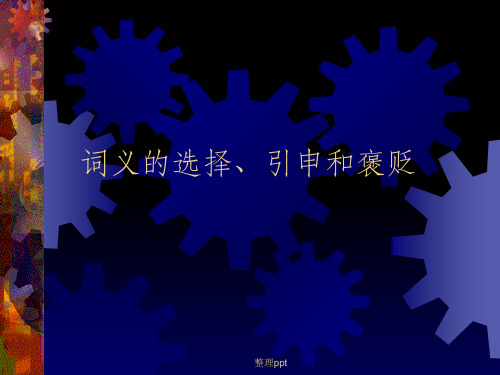
2、将带有特征性形象的词译 成该形象所代表的属性的词。
整理ppt
1) Rich and powerful, he always goosesteps on the street.
整理ppt
1) Goosestep的原义是从名词 “鹅步、正步” 转化而来的动 词,根据上下文引申,译成: “他有钱有势,在街上总是耀 武扬威,横行霸道。”
整理ppt
2)He is in critical condition, see-sawing between life and death.
整理ppt
2) See-saw原义是“跷跷 板”,这里引申译为:他的病 况危急,时好时坏,在生死之 间徘徊。
整理ppt
(二)具体化引申
整理ppt
语时一般作具体化引申。
整理ppt
2)He is a Shylock!
整理ppt
2) Shylock是莎士比亚笔下 的人物,其人刻薄歹毒,故该 句引申译为:他凶险狡诈。
整理ppt
Every life has its roses and thorns.
整理ppt
这里把玫瑰和刺引申,译为: “每个人的生活有苦有甜。”
整理ppt
整理ppt
2)他的学位成了他进入那家 公司获得高薪的敲门砖。
整理ppt
2. 英语中有些词在特定的上 下文中,含义是清楚的,但译 成汉语时还必须作具体化引申, 否则就不够清楚。
整理ppt
1) The car in front of me broke down and I missed the green.
整理ppt
She is a good Christian, a good parent, a good wife, a good daughter and a good teacher.
unit2:词语的选择
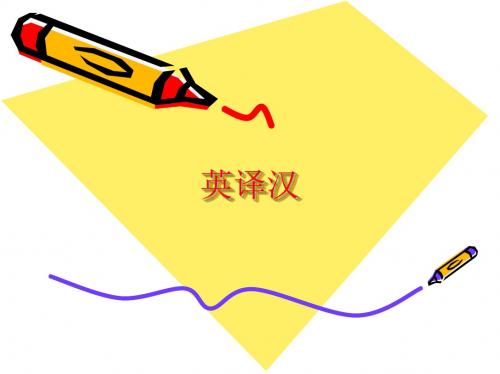
• 谎言
• 6) It is quite another story now. • 现在情况完全不同了
(三)注意汉语习惯搭配 Judging from collocation
• beat the system:钻制度的空子 • 意译:……于是便很想“与这个制度作对”
第一章 词义的选择、引申
一. 词义的选择 New homes are for sale 新房出售
I will see her home tonight. 今晚我送她回家
He’s at home with the classics 他精通古典文学
• (二) 词性相同时,根据上下文 • (judging from the context)
• She can appreciate modern art. • 她能欣赏现代艺术 • I appreciate the regard you have for
me, but I’m not qualified to take the job. • 我感谢你的帮助,但我不能胜任这项工 作。
需谨慎处理的
• 3. (person)纤弱的,娇弱的,虚弱的 • 4.(part of body)纤细的,娇嫩的, • 5.skillfuly made精美的;雅致的,精致的 • 6.(taste/smell/color) 柔和的,清淡的,淡雅
的
Continued : heavy
• heavy snow/rain/fog • heavy storm • heavy weather • heavy sky • heavy crops • heavy traffic • heavy soil • heavy road
词义的选择、引申和褒贬
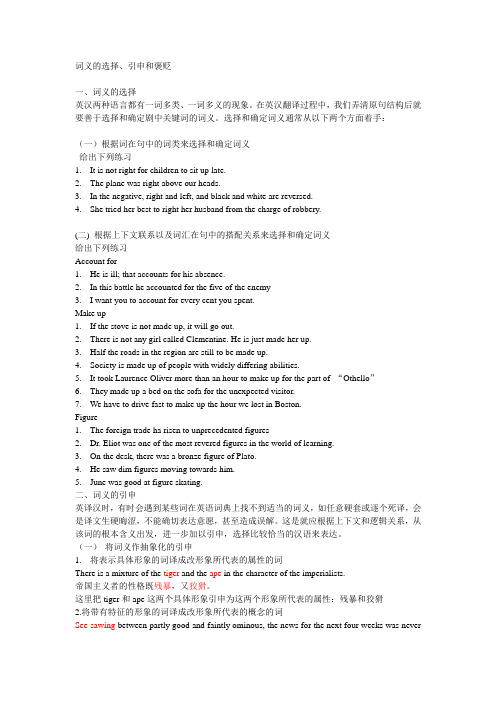
词义的选择、引申和褒贬一、词义的选择英汉两种语言都有一词多类、一词多义的现象。
在英汉翻译过程中,我们弄清原句结构后就要善于选择和确定剧中关键词的词义。
选择和确定词义通常从以下两个方面着手:(一)根据词在句中的词类来选择和确定词义给出下列练习1.It is not right for children to sit up late.2.The plane was right above our heads.3.In the negative, right and left, and black and white are reversed.4.She tried her best to right her husband from the charge of robbery.(二) 根据上下文联系以及词汇在句中的搭配关系来选择和确定词义给出下列练习Account for1.He is ill; that accounts for his absence.2.In this battle he accounted for the five of the enemy3.I want you to account for every cent you spent.Make up1.If the stove is not made up, it will go out.2.There is not any girl called Clementine. He is just made her up.3.Half the roads in the region are still to be made up.4.Society is made up of people with widely differing abilities.5.It took Laurence Oliver more than an hour to make up for the part of “Othello”6.They made up a bed on the sofa for the unexpected visitor.7.We have to drive fast to make up the hour we lost in Boston.Figure1.The foreign trade ha risen to unprecedented figures2.Dr. Eliot was one of the most revered figures in the world of learning.3.On the desk, there was a bronze figure of Plato.4.He saw dim figures moving towards him.5.June was good at figure skating.二、词义的引申英译汉时,有时会遇到某些词在英语词典上找不到适当的词义,如任意硬套或逐个死译,会是译文生硬晦涩,不能确切表达意愿,甚至造成误解。
翻译入门三
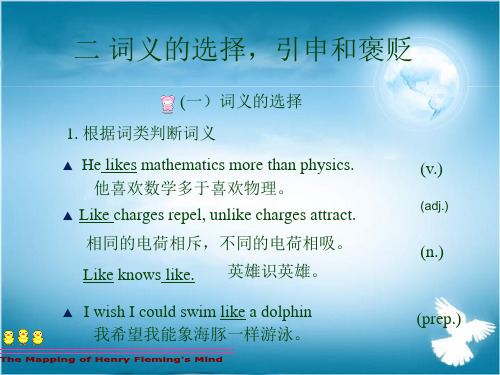
Edison invented the electric light lamp. 爱迪生发明了电灯。 He invented a story to explain why he was late. 他编造一个谎话,解释为什么迟到。 The beauty of the evening seduced me abroad. 傍晚的美景把我吸引到户外去。 The vile guy tried to seduce the young girl. 那无耻的家伙企图勾引那个女孩。
2. 根据语境及搭配关系判断词义
动词和名词搭配 形容词和名词搭配
形容词与介词搭配
动词与副词搭配
动词和名词搭配---develop
develop the heavy industry develop a method develop an interest develop a habit develop a plan develop one’s competence
我从不喝酒。 Wine
我不喝烈性酒。 spirits
汉译英时单词的选择
根据词的语体色彩来选词
日军的侵略的暴行激起人民极大的愤怒。
The atrocity of Japanese army’s aggression roused the people to great indignation.
Exercise(一)
He halted in the district where by night are found the lightest street, hearts, vows and librettos.
他在一个市区停了下来,那里的夜晚有最明亮的街道, 最愉快的心情,最轻易出口的誓言和最轻松的歌曲。
词义的选择与引申

飘逸版
• 我爱我的伊人,因为她美丽又动人;我恨 我的伊人,因为她已相许他人;我愿奉她 为完人,带她私奔离众人;她叫爱米莉真 醉人,家住东方羡煞旁人。
文言版
城东丽人兮,美名爱弥莉; 娇姿倾城兮,吾心之所系; 初既与余订婚兮,信誓而弃;
译文3: 我爱我的爱人,因为她很迷人;我恨我的爱人,因已许配他人; 她在我心中是美人,我带她私奔,以避开外人;她名叫虞美人, 是东方丽人。(张柏然)
I love my love with an E, because she's enticing; I hate her with an E, because she's engaged; I took her to the sign of the exquisite, and treated her with an elopement; her name's Emily, and she lives in the east.
词汇意义的七种类型
外延意义(概念意义)(denotative meaning ) 内涵意义(connotative meaning) 风格意义(stylistic meaning) 情感意义(affective meaning) 联想意义(reflective meaning) 搭配意义(collocative meaning) 主题意义(thematic meaning) --杰弗里 N 利奇 “semantics”
读书足以怡情, 足以博彩,足以 长才。其怡情也, 最见于独处幽居 之时;其博彩也, 最见于高谈阔论 之中;其长才也, 最见于处世判事 之际。
词义的选择与引申

9). I have butterflies in my stomach. 10). When I heard the news my heart came into my mouth.
9). I have butterflies in my stomach. 译文一:我胃痛。 译文二:我有一种想呕吐的感觉。 译文三:我好紧张。 10). When I heard the news my heart came into my mouth. 译文一:当我听到这个消息时,我心都跳 出来了。 译文二:当我听到这个消息时,我很吃惊。 译文三:当我听到这个消息时,我吓死了。
6 )Every life has its roses and thorns.
6 )Every life has its roses and thorns. 译文一:生活中既有鲜花又有芒刺(荆 棘)。 译文二:每个人的生命都其玫瑰和刺。 译文三:生活总会跌荡起伏。(有平坦和 坎坷的时候) 译文四:人生总是有两面性的。
参考译文: 1. 我父亲是那家餐馆的常客, 那里所有的服 务员都认识他. 2. 请看一下上次会议的记录. 3. 在中国我们每到一个城市, 就逛大街, 逛 商店, 逛公园, 上剧院, 下饭馆.
练习分析
5). There is a mixture of the tiger and the ape in the character of the imperialists.
参考译文: 5. 帝国主义者的性格既残暴, 又狡猾. 6.每个人的生活都是有甜有苦. 7. 我们都被他那种崇高的气质所打动了. . 10. 听到这个消息我吓得要命.
二 词义的引申
词义的选择、引申、褒贬
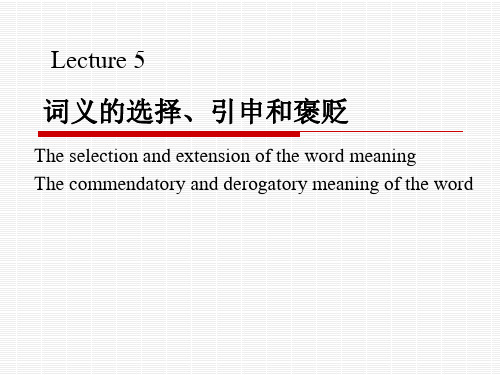
词义引申(具体——抽象)
Grey hair should be respected(synecdoche) The pen is mightier than the sword. (metonymy) The invention of machinery had brought into the world a new era---the Industrial Age. Money had become King. (metonymy) 机器的发明使世界进入到一个新纪元即工业时 代,金钱成了主宰一切的权威。 He is a rolling stone. I don’t think he can go far. 他是个见异思迁的人,我想他不会有多大出息。
三、词义的褒贬
有些词义是中立的,本身不表示褒义或者贬义, 但在一定的上下文中可能有褒贬的意味. demanding He found that being a CEO was a demanding job. 他发现当首席执行官是个费力的工作。 As a demanding boss, he expected total loyalty and dedication from his employers. 他是个苛刻的老板,要求手下的人对他忠心耿 耿,鞠躬尽瘁。
小结(summary)
词义的选择: 根据词性来选择词义(word meaning) 根据上下文来选择词义(context) 根据搭配关系来选择词义(collocation)
二、词义的引申(extension)
引申的方法:抽象化引申 & 具体化引申 抽象化引申:具体——抽象 Do you think this dictionary of English is the supreme court in all matters concerning English words? 你认为这本英语词典是英语词汇的权威词典吗? See-sawing between partly good and faintly ominous, the news for the next four weeks was never distinct. 在那以后的四个星期内,消息时而部分有所好转,时而 又有点不妙,两种情况不断地交替出现,一直没有明朗 化。
week 7 第四章1词义的选择、引申和褒贬
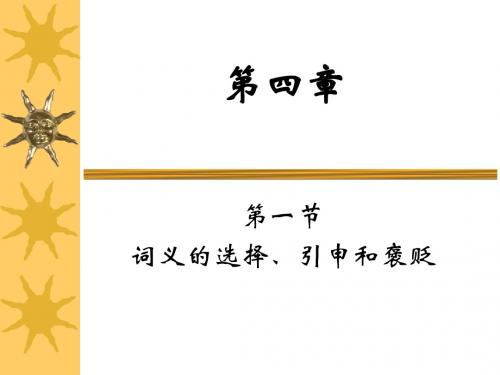
轻音乐 轻微的损失 轻便的汽车 轻松的心情 轻快的脚步 轻浮的举止 轻巧的装备 轻松的工作 轻柔的声音
Reasons for using diction: Polysemy and different collocation
eat soup heavy rain
strong wind
black tea
第四章
第一节 词义的选择、引申和褒贬
一、词义的选译 Diction
By ―diction‖ we mean the proper
choice of words and phrases in
translation on the basis of accurate comprehension of the original.
brown sugar
strong tea prime time
喝汤 大雨 大风 红茶 红糖 浓茶 黄金时间
选择词义的要领
1. 根据词性选择词义
2. 根据上下文及逻辑关系选择词义 3. 根据搭配选择词义
1. 根据词性选择词义
Every penny I earned from the work was
词义的引申主要包括:
– 抽象化引申 – 具体化引申 – 典故的词义引申
2.1 抽象化引申
I was practically on my knees but he still
refused. 我几乎是苦苦哀求,但他依然拒绝。 The two sisters were usually in agreement on most issues, but they were at swords’ points on the matter of abortion. 在很多问题上姐妹俩的意见通常是一致的, 但在人工流产问题上,她们是有激烈争 执的。
词义的选择、引申和褒贬1

(三) 根据全文或句子的知识内容
There are known knowns. These are things we know that we know. There are known unknowns. These are things that we know we don’t know. But there are also unknown unknowns. These are things we don’t know. 我们懂得我们知道一些人所知的情况,我们也懂得我们还不知道 众所周知的不可预测的形势,但还存在我们没有意识到我们不懂的 尚未了解的未知局面。
The insurance was invalid for the invalid. 该险种对残疾人无效。形容词,无效的;名词,残疾人
The wind was too strong to wind the soil. 风太大以至于吹不起风帆。名词,风;动词,吹动
The dump was full to refuse more refuse. 垃圾堆已堆满,不能再堆了。动词,拒绝;名词,垃圾
(二) 根据搭配
请让一让。
Excuse me. / Please let me pass. 她让我在雨里等了两个钟头。
She kept me waiting in the rain as long as two hours. 大夫让我卧床。
The doctor advised me to stay in bed. 他把客人让进来。
剧痛 急转弯 激烈的斗争
4. 尖刻,苛刻,易怒: A sharp tongue A sharp temper A sharp criticism
5. 刺骨,刺鼻,刺耳: A sharp frost A sharp smell A sharp voice
unit-5-词义的选择与引申-(1)
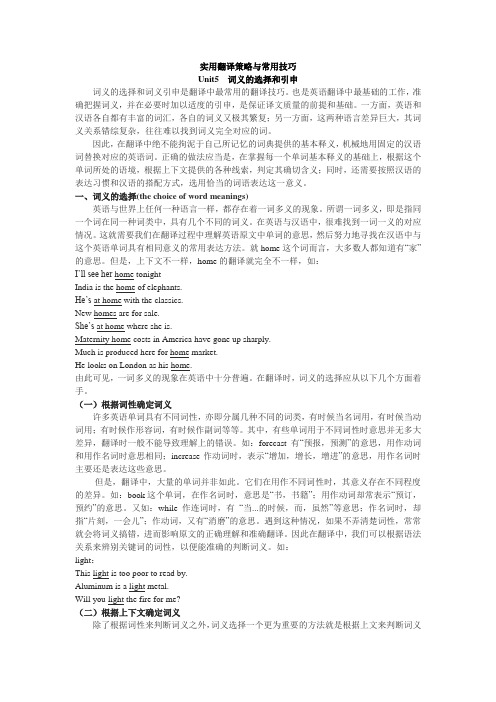
实用翻译策略与常用技巧Unit5 词义的选择和引申词义的选择和词义引申是翻译中最常用的翻译技巧。
也是英语翻译中最基础的工作,准确把握词义,并在必要时加以适度的引申,是保证译文质量的前提和基础。
一方面,英语和汉语各自都有丰富的词汇,各自的词义又极其繁复;另一方面,这两种语言差异巨大,其词义关系错综复杂,往往难以找到词义完全对应的词。
因此,在翻译中绝不能拘泥于自己所记忆的词典提供的基本释义,机械地用固定的汉语词替换对应的英语词。
正确的做法应当是,在掌握每一个单词基本释义的基础上,根据这个单词所处的语境,根据上下文提供的各种线索,判定其确切含义;同时,还需要按照汉语的表达习惯和汉语的搭配方式,选用恰当的词语表达这一意义。
一、词义的选择(the choice of word meanings)英语与世界上任何一种语言一样,都存在着一词多义的现象。
所谓一词多义,即是指同一个词在同一种词类中,具有几个不同的词义。
在英语与汉语中,很难找到一词一义的对应情况。
这就需要我们在翻译过程中理解英语原文中单词的意思,然后努力地寻找在汉语中与这个英语单词具有相同意义的常用表达方法。
就home这个词而言,大多数人都知道有“家”的意思。
但是,上下文不一样,home的翻译就完全不一样,如:I’ll see her home tonightIndia is the home of elephants.He’s at home with the classics.New homes are for sale.She’s at home where she is.Maternity home costs in America have gone up sharply.Much is produced here for home market.He looks on London as his home.由此可见,一词多义的现象在英语中十分普遍。
第六讲 词义的选择和引申

第六讲词义的选择和引申请看下面几个英文句子及其译文,体会词义选择技巧的运用。
1.The pilot turned the plane around and headed for home.A.飞行员掉转机头,朝家飞去。
B.飞行员掉转机头,朝基地飞去。
2.These were all labeled as good eggs.A.这些鸡蛋都贴有好鸡蛋的标签。
B.这些鸡蛋都贴有新鲜鸡蛋的标签。
3.Their success is a challenge to my efforts.A.他们的成功对我做出的努力是一个挑战。
B.他们的成功鞭策我做出努力。
4.I left my golf clubs and two bottles of brandy inside the car.A.我把高尔夫俱乐部还有两瓶白兰地酒遗忘在车里了。
B.我把高尔夫球杆还有两瓶白兰地酒遗忘在车里了。
一.词义的选择一般来说,词义主要分为语法词义、语境词义和搭配词义,翻译时要根据词语在语法、语境和搭配方面的实际情况,来选择符合原文意思并符合汉语表达习惯的词义。
(一) 语法词义根据语法来判断单词在句子中的词性,然后选择和确定其词义,即先确定单词在句子中属于哪一词性,然后根据词性,正确选择词义。
1.Each cable-car can seat up to six persons.2.Since you are so close, please close the door.3.My father is a regular in that restaurant, and all of the waiters know him.4.John has a surprise in store for him when he gets home tonight.5.The police are asking the public to help them find the two dangerous bank robbers.6.Eat what you can and can what you cannot.7.He saw a man sawing trees with a saw.8.The pigeon homed from a distance of 100 miles.\9.The sellers apparently admitted their fault, but refused to pay damages.(二) 语境词义根据单词在上下文语境的意义来选择和确定词义。
翻译技巧(1)词义的选择与引申
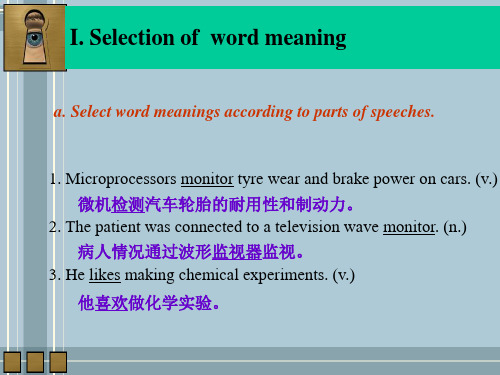
翻译练习 4
• low: 下半轴瓦;弱阻尼;下限;低强度 电流;仰视拍摄;低音调键;慢速存取 ;低位;低速制动
• 帝国主义者的性格即残暴,又狡猾。 • 2. Everyone has rain and sunshine (roses and thorns)
in their life. • 每个人的生活都有甜有苦。
II. Extension of word meaning
三、改换说法 1. During the first part of his life, Lincoln was a storekeeper and
为了研制这种仪器请了很多专家。 3. In developing the design, the engineer must apply his knowledge
of engineering and material science. 在进行设计时工程师必须运用工程学和材料学方面的知识。 4. In order to develop our power industry, we must produce more and pore powerful generators. 为了发展我国的电力工业, 我们必须生产越来越多的大功率 发电机
4. Like charges repel each other, unlike charges attract. (adj.) 同性电荷相斥,异性电荷相吸。
5. Like the human brain, a computer also has a memory where it can store vast quantities of information. (prep.) 计算机像人脑一样, 也有一个能储存大量信息的存储器
翻译技巧--词义的选择与引申
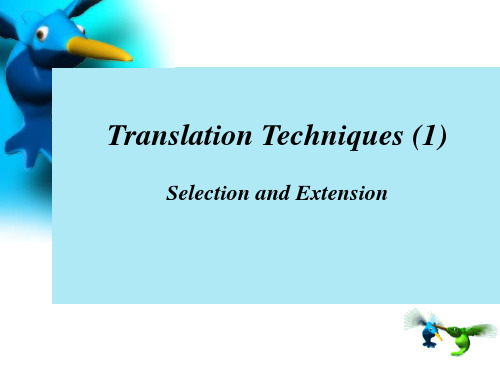
希特勒夺取了政权之后就推行侵略政策。(贬义) 3. Hans was too obviously flattering the gentleman by saying he was the most courageous man he had ever seen. 汉斯说,这位先生是他所见过的最有胆识的人。这种阿谀 奉承未免过于露骨。(贬义) • 4. Mr. Brown felt greatly flattered when he received the invitation to deliver a lecture. • 布朗先生接到作演讲的邀请时感到非常荣幸。(褒义)
Step 2 Translation techniques 1
二、具体词语抽象化
• 1. The character of these people is a mixture of the tiger and the ape. • 帝国主义者的性格即残暴,又狡猾。 • 2. Everyone has rain and sunshine (roses and thorns) in their lislation techniques 1
A. Selection of Word Meanings
a. Select word meanings according to parts of speeches.
1. He likes making chemical experiments. (v.)
他喜欢做化学实验。
Step 2 Translation techniques 1
3. Like charges repel each other, unlike charges attract. (adj.)
翻译时如何注意词义的选择和引申?

翻译时如何注意词义的选择和引申?翻译时如何注意词义的选择和引申?引导语:翻译时如何注意词义的选择和引申?下面就和店铺一起来看看吧。
一、词义如何选择英文中一词多义的现象非常普遍。
例如:英语story一词在不同的上下文中可以有不同的词义:例:It is quite another story now.现在情况完全不同了。
例:The officials concerned refused to confirm the story in the Post. 有关官员拒绝证实《邮报》的这条消息。
例:The white-haired girl’s story is one of the saddest.白毛女的遭遇可算是最悲惨的。
例:A young man came to police station with a story.一个年轻人来到警察局报案。
遇到英语多义词时必须结合上下文反复推敲,切忌望词生义,不求甚解。
尤其遇到多义常用词时,不要想当然地把自己懂得的词义放到文章中去。
例:Albert Einstein, who developed the theory of relativity, arrived at this theory through mathematics.误: 阿尔伯特·爱因斯坦发展了相对论,他是通过数学方法得出这一理论的。
(此处develop应译为“创立”)再以consequence一词为例,考研真题中该词曾出现过三次:Consequence在三句中的分别译为:“推论”“结果”“影响”。
例: consequenceOthers are reasonable consequences of particular advances in science being to some extent self-accelerating. (1996:71) 其他原因则是由于科学在一定程度上自我加速而取得特定发展的必然结果。
第一节 词义的选择和引申
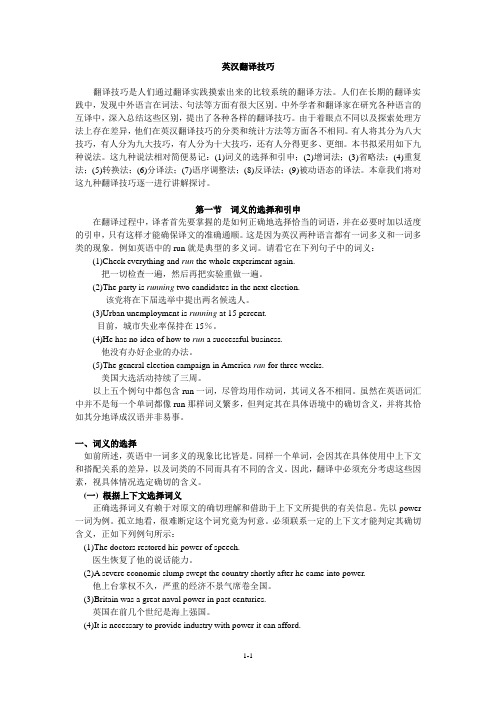
英汉翻译技巧翻译技巧是人们通过翻译实践摸索出来的比较系统的翻译方法。
人们在长期的翻译实践中,发现中外语言在词法、句法等方面有很大区别。
中外学者和翻译家在研究各种语言的互译中,深入总结这些区别,提出了各种各样的翻译技巧。
由于着眼点不同以及探索处理方法上存在差异,他们在英汉翻译技巧的分类和统计方法等方面各不相同。
有人将其分为八大技巧,有人分为九大技巧,有人分为十大技巧,还有人分得更多、更细。
本书拟采用如下九种说法。
这九种说法相对简便易记:(1)词义的选择和引申;(2)增词法;(3)省略法;(4)重复法;(5)转换法;(6)分译法;(7)语序调整法;(8)反译法;(9)被动语态的译法。
本章我们将对这九种翻译技巧逐一进行讲解探讨。
第一节词义的选择和引申在翻译过程中,译者首先要掌握的是如何正确地选择恰当的词语,并在必要时加以适度的引申,只有这样才能确保译文的准确通顺。
这是因为英汉两种语言都有一词多义和一词多类的现象。
例如英语中的run就是典型的多义词。
请看它在下列句子中的词义:(1)Check everything and run the whole experiment again.把一切检查一遍,然后再把实验重做一遍。
(2)The party is running two candidates in the next election.该党将在下届选举中提出两名候选人。
(3)Urban unemployment is running at 15 percent.目前,城市失业率保持在15%。
(4)He has no idea of how to run a successful business.他没有办好企业的办法。
(5)The general election campaign in America ran for three weeks.美国大选活动持续了三周。
以上五个例句中都包含run一词,尽管均用作动词,其词义各不相同。
- 1、下载文档前请自行甄别文档内容的完整性,平台不提供额外的编辑、内容补充、找答案等附加服务。
- 2、"仅部分预览"的文档,不可在线预览部分如存在完整性等问题,可反馈申请退款(可完整预览的文档不适用该条件!)。
- 3、如文档侵犯您的权益,请联系客服反馈,我们会尽快为您处理(人工客服工作时间:9:00-18:30)。
译文2:
我爱我的那个“丽”,可爱迷人有魅力;我恨我的那个
“丽”,要和他人结伉俪;她文雅大方又美丽,和我出逃去游
历; 她芳名就叫爱米丽,家住东方人俏丽。(马红军)
I love my love with an E, because she's enticing; I hate her with an E, because she's engaged; I took her to the sign of the exquisite, and treated her with an elopement; her name's Emily, and she lives in the east.
Translation
I love my love with an E, because she‘s enticing; I hate her with an E, because she’s engaged; I took her to the sign of the exquisite, and treated her with an elopement (私奔) ; her name's Emily, and she lives in the east. (Dickens, David Copperfield)
Studies serve for delight, for ornament, and for ability. Their chief use for delight is in privateness and retiring; for ornament, is in discourse; and for ability, is in the judgment and disposition of business.
悔伊邂逅王孙兮,拜金逐利;
私奔离我而去兮!
恨兮!
痛兮!
粤语版
• 我好鬼中意我条女,因为距好suo架;不过 我又好鬼憎距,距竟然同左个麻甩佬订左 婚;我一直都当距系我第时果个架,仲叫 距一齐同我着草添;距既名叫爱米莉,住 系我屋企东边。
Correspondence at word level
• (1) word-for-word correspondence • eg. laser激光 ; aspirin 阿斯匹林
读书足以怡情, 足以博彩,足以 长才。其怡情也, 最见于独处幽居 之时;其博彩也, 最见于高谈阔论 之中;其长才也, 最见于处世判事 之际。
杜甫的诗《春望》中的“国破山河在” Though a country be sundered(分开), hills and rivers endure. ----Bynner (虽然)(一个)国家(被)隔绝(,)(群)山 (和)河流忍耐(着)(。) A nation though fallen, the land yet remains. -----W.J.B.Fletcher (一个)国家(虽然)沦陷(,)(那)土地(仍 然)留存(。) The state may fall, but the hills and streams remain. -----David Hawkes (这个) 国家(也许)沦陷(,)(但)(这)(群) 山(和)小溪留存(。)
学生1:
联宠爱妃,因其想入菲菲;
联恨爱妃,欲与人比翼双飞; 爱妃容颜世上绝非,愿带其远走高飞;
爱妃兰名芳菲,如东方翠翡。
I love my love with an E, because she's enticing; I hate her with an E, because she's engaged; I took her to the sign of the exquisite, and treated her with an elopement; her name's Emily, and she lives in the east.
译文3: 我爱我的爱人,因为她很迷人;我恨我的爱人,因已许配他人; 她在我心中是美人,我带她私奔,以避开外人;她名叫虞美人, 是东方丽人。(张柏然)
I love my love with an E, because she's enticing; I hate her with an E, because she's engaged; I took her to the sign of the exquisite, and treated her with an elopement; her name's Emily, and she lives in the east.
(2) one---multiple equivalents of the same meaning (optional equivalence) wife: 妻子,爱人,夫人,老婆,老伴,媳妇,堂客,内 人,贱内 • potato: • 马铃薯,洋芋,土豆、山药蛋 人: • human being, man, people, person,--犬:
外延意义不对应
红茶 红眼 红眼病 白酒 税
black tea to be green-eyed (red-eye 廉价
的威士忌酒)
Pinkeye spirits/liquor (不是white wine 白葡萄酒) Tax/ duty/ tariff 关税,税率
情感意义不对应
“精神文明”被译spiritual civilization,在外国人的心 目中含有宗教色彩,现在改“ethical and cultural progress”或是“cultural life”以及其他译法。 过去我们在对外宣传中,一直把“宣传”译为 “propaganda”(贬义的成分为多,使人易与吹牛、 说谎、怀有政治目的等负面含义联系起来),现在 多使用“publicity”等中性词;
(4)words without equivalents • 阴 / 阳 : the soft inactive female principle or force in the world • clock-watcher: 老是看钟等下班的人 • alibi: 不在犯罪现场的证据 • Yellow publications: 品位较低的出版物 • pornography春画,色情文学
译文1:
我爱我的心上人,因为她那样地叫人入迷(enticing);我恨
我的心上人,因为她已订婚将作他人妻(engaged);她花容月貌 她的名字叫埃米莉(Emily),她的家就在东城里(east)。我爱 我的心上人呀,一切都因为这个E!(陆乃圣)
无可比拟( exquisite ),我劝她私奔跟我在一起( elopement );
I love my love with an E, because she's enticing; I hate her with an E, because she's engaged; I took her to the sign of the exquisite, and treated her with an elopement; her name's Emily, and she lives in the east.
I love my love with an E, because she's enticing; I hate her with an E, because she's engaged; I took her to the sign of the exquisite, and treated her with an elopement; her name's Emily, and she lives in the east.
Dicቤተ መጻሕፍቲ ባይዱion
• Diction means the proper choice of words and phrases in translation on the basis of accurate comprehension of the original. • A noted linguist said, “the meaning of a word is its use in the language and each word, when used in a new context, is a new word.
学生2: 纤纤丽人,家住东方 婚定他人,即将拜堂 吾既闻之,百转愁肠 纤纤丽人,我心所向 丽人闻之,与我同伤 相约南墙,远走他方
飘逸版
• 我爱我的伊人,因为她美丽又动人;我恨 我的伊人,因为她已相许他人;我愿奉她 为完人,带她私奔离众人;她叫爱米莉真 醉人,家住东方羡煞旁人。
文言版
城东丽人兮,美名爱弥莉; 娇姿倾城兮,吾心之所系; 初既与余订婚兮,信誓而弃;
No
context, no translation.
Context
There are three kinds of context • Linguistic context • Situational context • Cultural context
• Linguistic context – Linguistic context refers to cohesion结 合and coherence相干性within a text • Situational context – It is related to the situation, the participants, and the thing mentioned. • Cultural context – It is related to culture and background. • A good translation must be based on the consideration of the three contexts.
